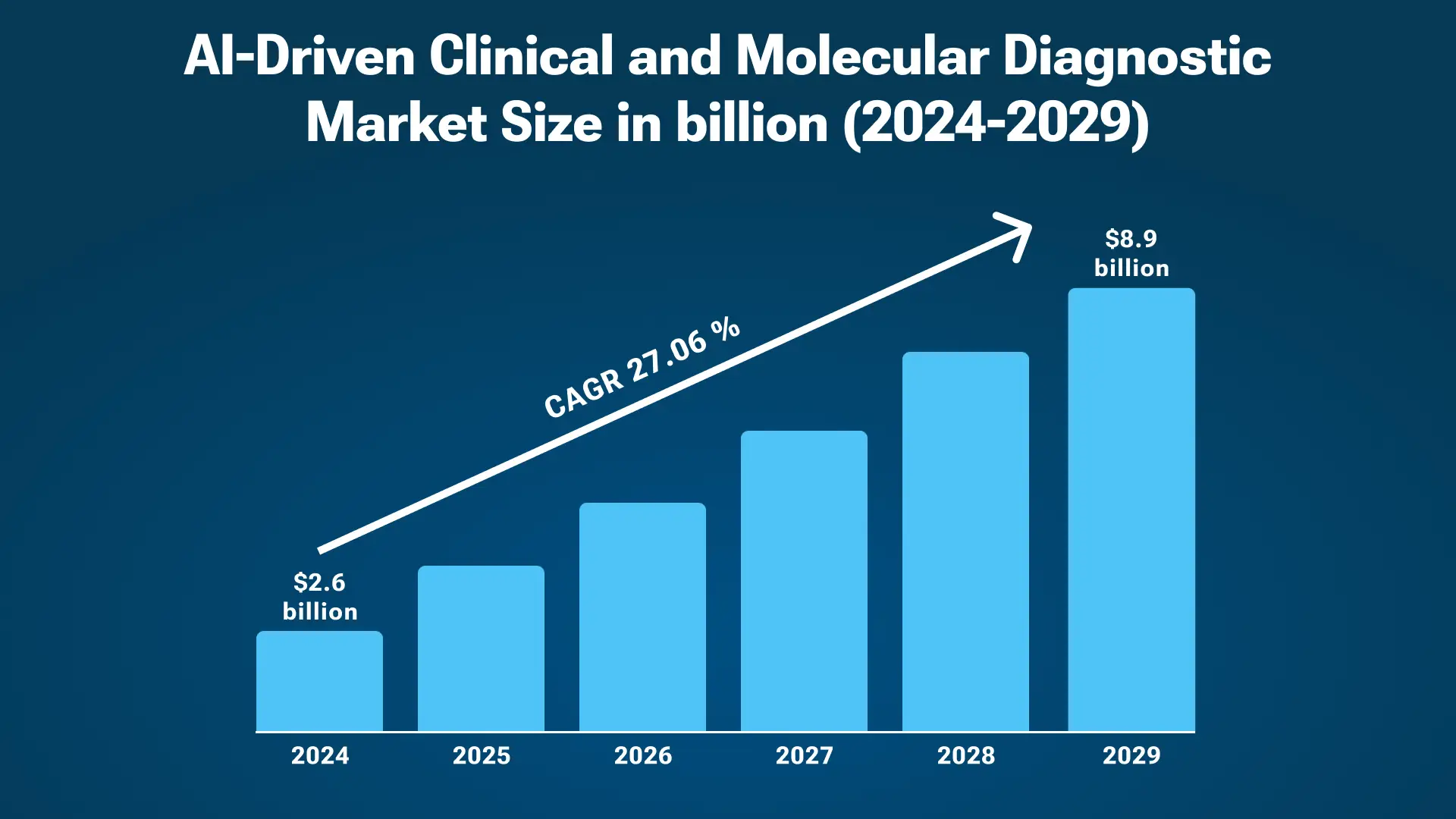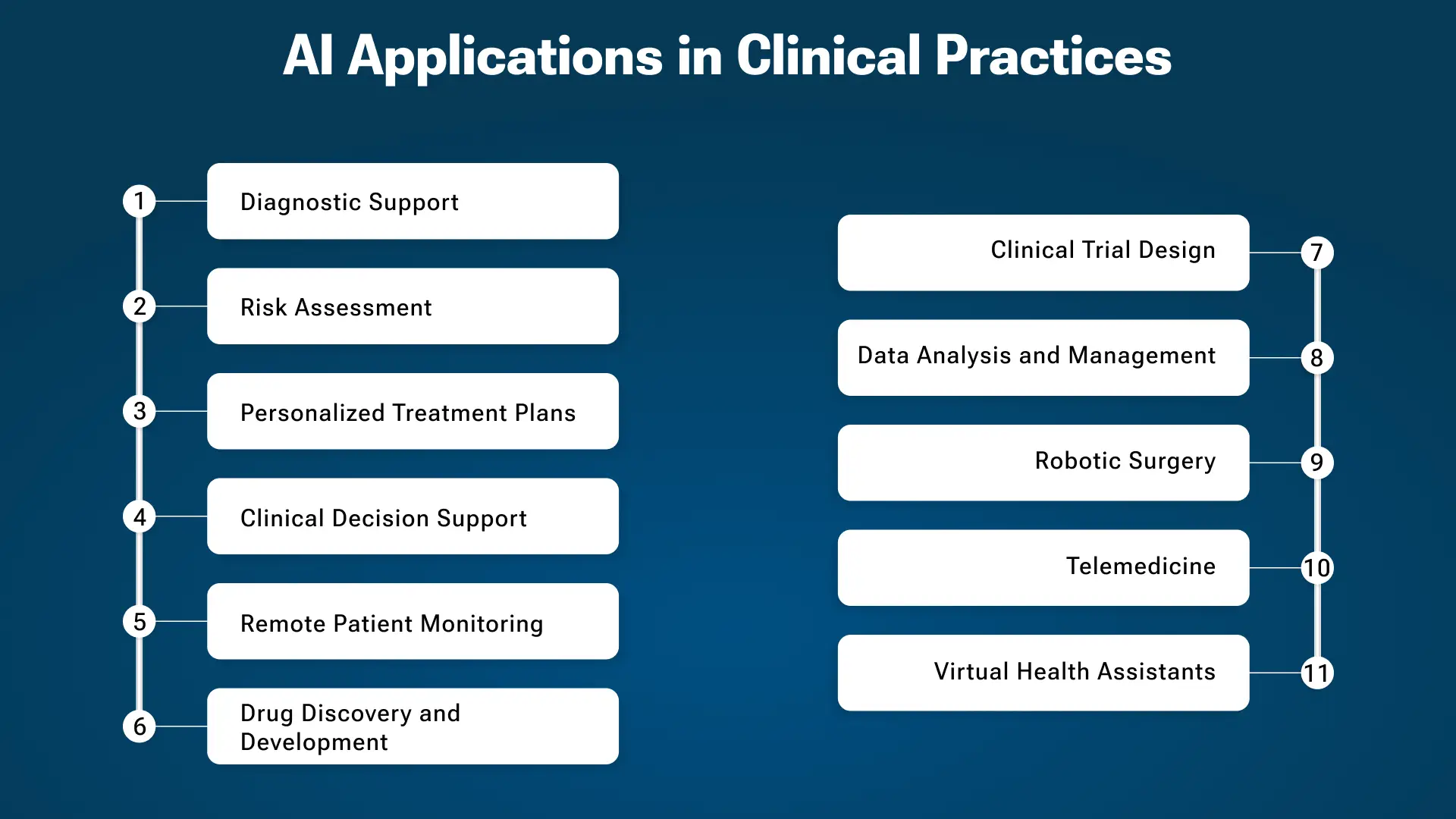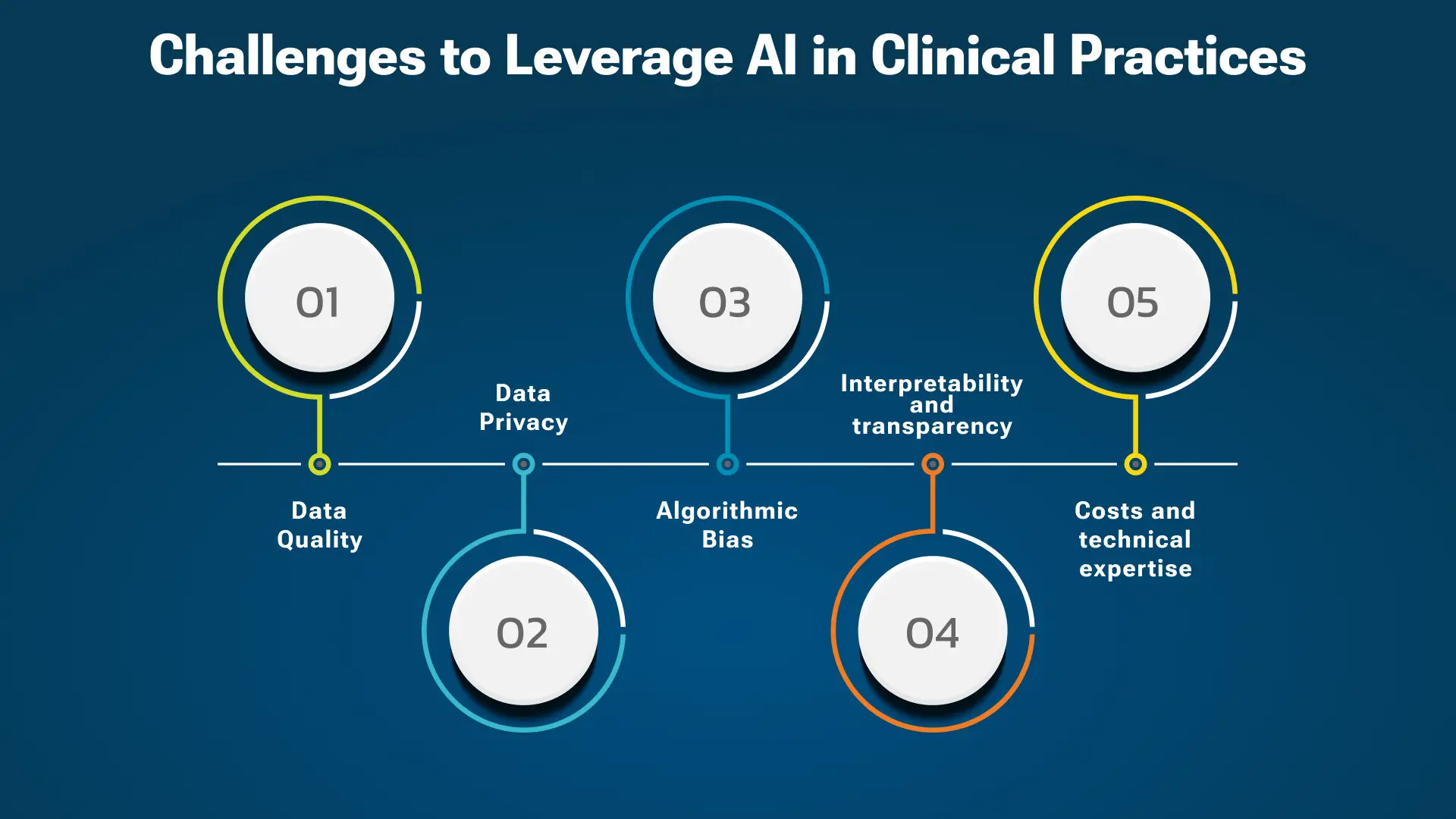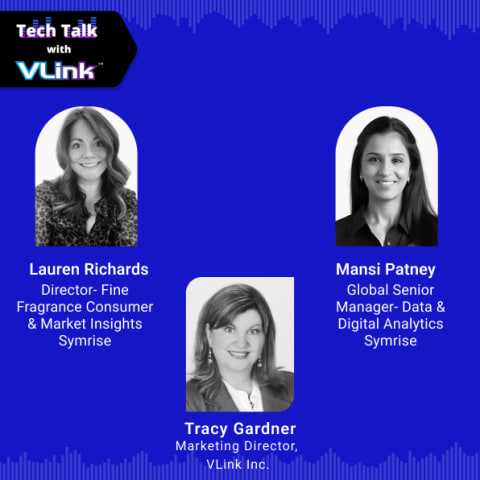Artificial Intelligence (AI) in healthcare, especially in clinical practice, is becoming increasingly prevalent. AI-driven clinical and molecular diagnostic market was valued at $2.6 billion in 2024 and is projected to grow $8.9 billion by 2029, with a substantial CAGR of 27.06%.

AI in clinical practice is revolutionizing the healthcare domain, empowering medical professionals to streamline diagnostic procedures with precision and efficiency. So, it wouldn’t be wrong if we say AI is a powerful tool that helps doctors give patients the best care possible while also saving costs and improving the healthcare system.
Let's discover applications of AI in healthcare services with real-world examples, benefits, and challenges of using artificial intelligence in clinical practices, showcasing how AI is transforming healthcare.
Role of Artificial Intelligence in Clinical Practices
The impact of Artificial Intelligence in healthcare services is profound, significantly transforming clinical practices. From diagnosis and treatment planning to risk assessment and patient monitoring, AI systems—driven by data and machine learning—assist healthcare professionals with invaluable insights. Today, 40% of hospitals now use AI, highlighting its growing role in the industry. Ultimately, it leads to better patient care, more accurate decision-making, and streamlined clinical workflows.
Key Applications of AI in Clinical Practices
Artificial Intelligence is transforming healthcare clinical practices by introducing a range of valuable applications. Here are some of the key AI applications in clinical practices:
Diagnostic Support
One of the most important applications of artificial intelligence in healthcare market and clinical practices is diagnostic support. AI algorithms can identify medical images (X-rays, MRIs, CT scans) to detect abnormalities, including tumors or early signs of diseases like cancer, cardiovascular conditions, and eye diseases, with higher accuracy and speed.
For instance, DeepMind, a Google-owned artificial intelligence company, launched its AI system that can detect over 50 eye diseases, including diabetic retinopathy and macular degeneration, with 94% accuracy, matching world’s leading eye experts.
Risk Assessment
Another use of artificial intelligence in healthcare services is patient risk prediction. By analyzing high-risk patient data, AI model can predict potential complications or adverse events, allowing for proactive interventions and preventative care.
Johns Hopkins Hospital uses AI systems “TREWS” to forecast the risk of sepsis in hospitalized patients with 85% accuracy. It analyzes results in real-time, offering early warnings to clinicians.
Personalized Treatment Plans
By analyzing a patient’s medical history, genetics, lifestyle, and current health status, artificial intelligence can help clinicians tailor treatment plans. The role of AI in the healthcare industry is to recommend the most appropriate medications and therapies based on individual needs, including personalized chemotherapy plans for cancer patients. IBM's Watson for Oncology (WFO), a clinical cognitive computing system, is a prime example of artificial intelligence in healthcare. It uses advanced AI algorithms to assist oncologists in delivering personalized cancer treatment plans customized to each patient’s genetic makeup and medical history.
Clinical Decision Support
ML and artificial intelligence trends in healthcare are revolutionizing the way clinical providers make decisions. AI-powered tools can offer real-time recommendations and alerts during clinical decision-making by analyzing patient data and presenting relevant guidelines based on evidence.
Artificial intelligence helps healthcare professionals in diagnosing, treatment planning and health management by delivering data. It will perform certain tasks autonomously using AI in the future. With NLP, artificial intelligence can also translate clinical notes in EHRs, enabling medical staff to enter data just once.
The Mayo Clinic uses an AI-driven clinical decision support tool that’s another example of AI in the healthcare industry. This system suggests the most appropriate diagnostic tests or treatments as per patient symptoms and medical records.
Remote Patient Monitoring
AI-powered tools can be used to analyze continuous patient data (heart rate, blood pressure, activity levels) from wearable devices, sensors, or remote patient monitoring systems. It helps to detect early signs of deterioration and trigger timely interventions.
Another real-world example of AI in healthcare services, especially remote patient monitoring, is Medtronic’s AI-powered Guardian Connect system. It continuously monitors glucose levels in diabetes patients and predicts hypoglycemic events up to an hour in advance.
Drug Discovery and Development
The process of creating pharmaceuticals through clinical trials can take over a decade and cost billions. However, integrating AI in drug discovery not only accelerates this process but also makes it significantly more cost-effective.
By leveraging machine learning in healthcare industry, vast datasets can be quickly analyzed, enabling the rapid identification of potential drug candidates. This streamlines the lead discovery process, ultimately saving both time and resources for researchers and pharmaceutical companies.
Exscientia, a UK-based AI company, developed the first AI-designed drug candidates, DSP-1181, for obsessive-compulsive disorder (OCD), which entered human trials within 12 months—a fraction of the usual timeline.
Clinical Trial Design
AI in clinical trial design helps optimize patient recruitment, enhance data analysis, and predict outcomes. By analyzing large datasets, the artificial intelligence system identifies suitable candidates, reduces trial costs, and improves efficiency.
Machine learning in healthcare industry also assists in designing more accurate trials, ensuring better results and faster drug development in healthcare.
Data Analysis and Management
Data analysis and management is a crucial application of AI in healthcare practices. AI algorithms process vast amounts of medical data, identifying patterns and insights that aid in diagnosis, treatment planning, and personalized care.
It enhances patient record management, streamlines workflows, and supports predictive analytics. Enabling healthcare providers to make informed decisions for improved outcomes and operational efficiency.
Massachusetts General Hospital using AI-driven systems to analyze and organize unstructured clinical data, like physician notes, enhancing electronic health record (EHR) usability and advanced predictive analytics by collecting key insights from previous complex to evaluate medical information.
Robotic Surgery
AI-driven robotic surgery is a cutting-edge application of artificial intelligence in healthcare services. It helps surgeons in performing minimally invasive surgeries with unmatched accuracy.
This system interprets real-time data from cameras, sensors, and surgical instruments, ensuring precise and steady movements and reducing human errors. Integrating AI into robotic technology results in minimal incisions, less trauma, and speed up recovery times.
The da Vinci Surgical System is an AI-powered robotic system that gives surgeons an advanced set of instruments to perform robotic-associated minimally invasive surgeries on prostatectomies and even repairs of the cardiac valve with accuracy.
Telemedicine
When talking about how artificial intelligence helps healthcare, telemedicine emerges as one of the main AI in clinical practices. It enables remote consultants and real-time patient monitoring, increasing access to healthcare services.
AI-powered telemedicine empowers healthcare access, minimizing physical hospital visits and saving costs for both providers and patients. Diagnostic tools gather patient information and recommend further steps, reducing time for both doctors and patients.
The best example of artificial intelligence in healthcare market is Teladoc Health. This AI-integrated system identifies patient’s reported symptoms during virtual consultations. It provides physicians with diagnostic suggestions and potential personalized treatment options.
Virtual Health Assistants
AI-powered virtual health assistants enhance patient engagement and streamline healthcare services. It provides medication reminders, health tips, and answers to common medical queries. By leveraging Natural Language Processing and conversational AI in healthcare, chatbots and virtual assistants offer personalized interactions that improve patient satisfaction and adherence to treatment plans.
In addition, this healthcare chatbot offers 24/7 customer support, making clinical practices more accessible and responsive to patient needs.
Babylon Health's AI chatbot conducts initial health evaluations by examining the symptoms input by users and recommending whether they need medical advice or focus on personal well-being.
Benefits of Artificial Intelligence in Clinical Practices
Using artificial intelligence for clinical practices offers several advantages that help enhance. Mentioned below are some of the many benefits of AI in healthcare practices.
Improved Diagnostic Accuracy
AI minimizes diagnostic errors by identifying accurate medical data, leading to reliable results. Machine learning in clinical practices can detect patterns in medical imaging, lab reports, and patient histories, minimizing human errors and improving diagnosis and treatment effectiveness.
Enhanced Operational Efficiency
One of the most important benefits of AI in healthcare practices is enhancing workflow efficiency. AI automates routine administrative and clinical tasks, allowing healthcare professionals to focus on patient care. Integrating AI in healthcare market results in faster treatment and improved overall healthcare service delivery.
Cost Reduction
By automating time-consuming tasks and improving decision-making, Artificial intelligence contributes to cost saving, ensuring healthcare organizations can operate within budget while maintaining quality care. Predictive analytics can predict patient needs and allocate resources efficiently, minimizing unnecessary costs.
Better Patient Outcomes
Another crucial advantage of implementing AI in healthcare services is enabling early detection and effective treatment for improved recovery rates. By leveraging predictive analytics and advanced imaging technologies, healthcare providers can deliver effective treatments That ultimately lead to better patient outcomes and faster recovery.
Scalability
Last but not least, scalability is another benefit of integrating artificial intelligence in healthcare market. From small clinics to established hospitals, every healthcare organization can use several clinical settings without compromising the quality of care.
Integrating AI into clinical practices offers several benefits, revolutionizing healthcare with proactive, accurate, and cost-effective patient care solutions.
Implementation Guide: How to Get Started with AI in Clinical Practice
Successfully integrating AI into clinical workflows requires a structured approach. Here’s a step-by-step guide to help healthcare providers adopt AI tools effectively:
Step 1: Assess Clinic Needs
Begin by evaluating your clinic’s specific challenges and opportunities. Identify areas where AI can offer the most value—whether it's diagnosis support, personalized treatment plans, or administrative automation.
Step 2: Choose the Right Vendor
Not all AI solutions are the same. Use a comparison table to assess potential vendors based on factors like cost, features, integration capabilities, data security, and support services. Make sure the solution aligns with your clinic’s size, specialties, and compliance requirements.
Step 3: Train Staff
Training is crucial for successful AI adoption. Ensure all healthcare professionals and administrative staff understand how to use the tools efficiently. Provide hands-on workshops and ongoing support to ease the transition and build trust in AI technologies.
Challenges of Implementing Artificial Intelligence in Clinical Practices
Implementing AI in clinical practices faces several challenges, from lack of quality medical data and data privacy concerns to regulatory hurdles and data scarcity. All of which raise concerns about the reliability and accuracy of AI-driven clinical decisions.
Let's delve deeper to understand the impact of the following challenges on the healthcare industry.

One of the biggest challenges to leveraging artificial intelligence trends in healthcare services is the fragmentation of medical data across different systems. It leads to inconsistencies and difficulty in gathering high-quality datasets for training accurate AI models. To overcome this barrier, you need to build consistent data collection practices across healthcare systems to improve data quality and accessibility.
Another key barrier to utilizing artificial intelligence for healthcare services is the patient's data privacy and algorithmic bias. As patient data is highly sensitive, it's essential to take robust security measures and implement strong data encryption and anonymization techniques to protect sensitive information. So, it's recommended to look for a leading ML and AI development company that can offer a wide range of security options to protect patient privacy.
The complexity of AI models often presents challenges in terms of interpretability and transparency. To build trust and confidence, it becomes essential to understand how these models work and make decisions. It further increases the adoption of artificial intelligence in healthcare practices.
Implementing AI in clinical settings requires significant investment in terms of costs and technical expertise. The process includes establishing and maintaining the required infrastructure while bringing on board skilled data scientists and AI experts. However, It poses a substantial commitment, creating a challenge for widespread adoption.
Cost of AI in Clinical Practices
While Artificial Intelligence brings transformative potential to clinical practices, understanding the cost implications is critical for healthcare providers evaluating adoption.
Cost Comparison: AI Tools vs. Traditional Methods
- Virtual Patient Simulators powered by AI can range from $20,000 to $100,000, depending on complexity and integration capabilities. In contrast, traditional high-fidelity mannequins used for simulation training typically cost between $50,000 to $200,000, with limited adaptability and higher maintenance needs.
- AI-powered diagnostic systems (e.g., radiology AI platforms) often require an initial investment for integration but reduce the need for repetitive diagnostic tests and minimize human error over time.
- AI tools are also more scalable and updatable than physical tools, reducing the long-term cost of training and diagnostics.
ROI of AI in Clinical Practices
The return on investment (ROI) in AI-driven clinical solutions is becoming increasingly evident:
- Reduced diagnostic errors can save hospitals millions annually by preventing costly misdiagnoses or delayed treatments.
- Operational efficiency improves with AI-enabled scheduling, documentation, and patient flow systems, freeing up clinicians’ time and improving patient throughput.
- Personalized treatment plans generated through AI analytics lead to better patient outcomes, reducing readmissions and treatment failures.
- Training ROI is also high: Virtual AI-based training tools require no physical space, are reusable, and can simulate a wide range of medical scenarios, unlike traditional methods.
A 2023 report by Accenture estimates that AI applications could save the U.S. healthcare system up to $150 billion annually by 2026, especially in areas like robot-assisted surgery, virtual nursing assistants, and administrative workflow assistance.
The Future of AI in Healthcare Services
This figure showcases the immense potential of AI to redefine diagnostics, patient care, and treatment planning. With a substantial CAGR of 44% from 2022 to 2032, ML and artificial intelligence trends in healthcare services are driving innovation and reshaping clinical practices across the industry.
Emerging technologies are further accelerating this transformation:
- Generative AI is being used to create dynamic virtual patient scenarios for training medical students and simulating complex clinical cases, enhancing the quality of medical education and preparedness.
- AR/VR integration with AI, such as the use of Microsoft HoloLens in surgical training, allows for immersive, hands-on learning experiences that improve surgical precision and reduce training risks.
- AI-driven adaptive learning platforms like Osmosis personalize the educational journey for healthcare professionals, adjusting to their learning pace and preferences while ensuring knowledge retention.
These innovations are not only transforming how healthcare professionals are trained but are also laying the groundwork for smarter, more responsive healthcare systems of the future.

Contact VLink to Integrate AI into Your Clinical Practices!
VLink is a leading AI development company with a great history of empowering pharmaceutical and healthcare organizations to harness the full potential of artificial intelligence. From streamlined clinical workflow and diagnostics to treatment planning and patient monitoring, we deliver custom AI solutions for healthcare that meets the unique demands of the industry.
For instance, we have developed an innovative healthcare app for Health Dialog, which enables users to easily get the required information and track various illnesses (such as high blood pressure or obesity), promoting wellness.
Our proven track record of providing AI-driven healthcare development solutions for various healthcare brands speaks volumes of our competence in delivering custom clinical artificial intelligence solutions.
By partnering with us, you will leverage the potential of advanced AI technology in healthcare as well as benefit from a dedicated team of 500+ experts who understand unique challenges and opportunities within healthcare services.
As your trusted partner, VLink is ready to guide you through the journey of digital transformation in healthcare with precision and expertise.
Final Thought!
AI is no longer a sci-fi idea; it's transforming clinical procedures nowadays. The advantages are numerous, ranging from improving diagnostic precision to expediting the provision of healthcare. But for long-term growth, it's essential to resolve data security and ethical concerns. Medical practitioners who want to give patients the best care possible must embrace AI in healthcare services and clinical practices.









 Shivisha Patel
Shivisha Patel

















